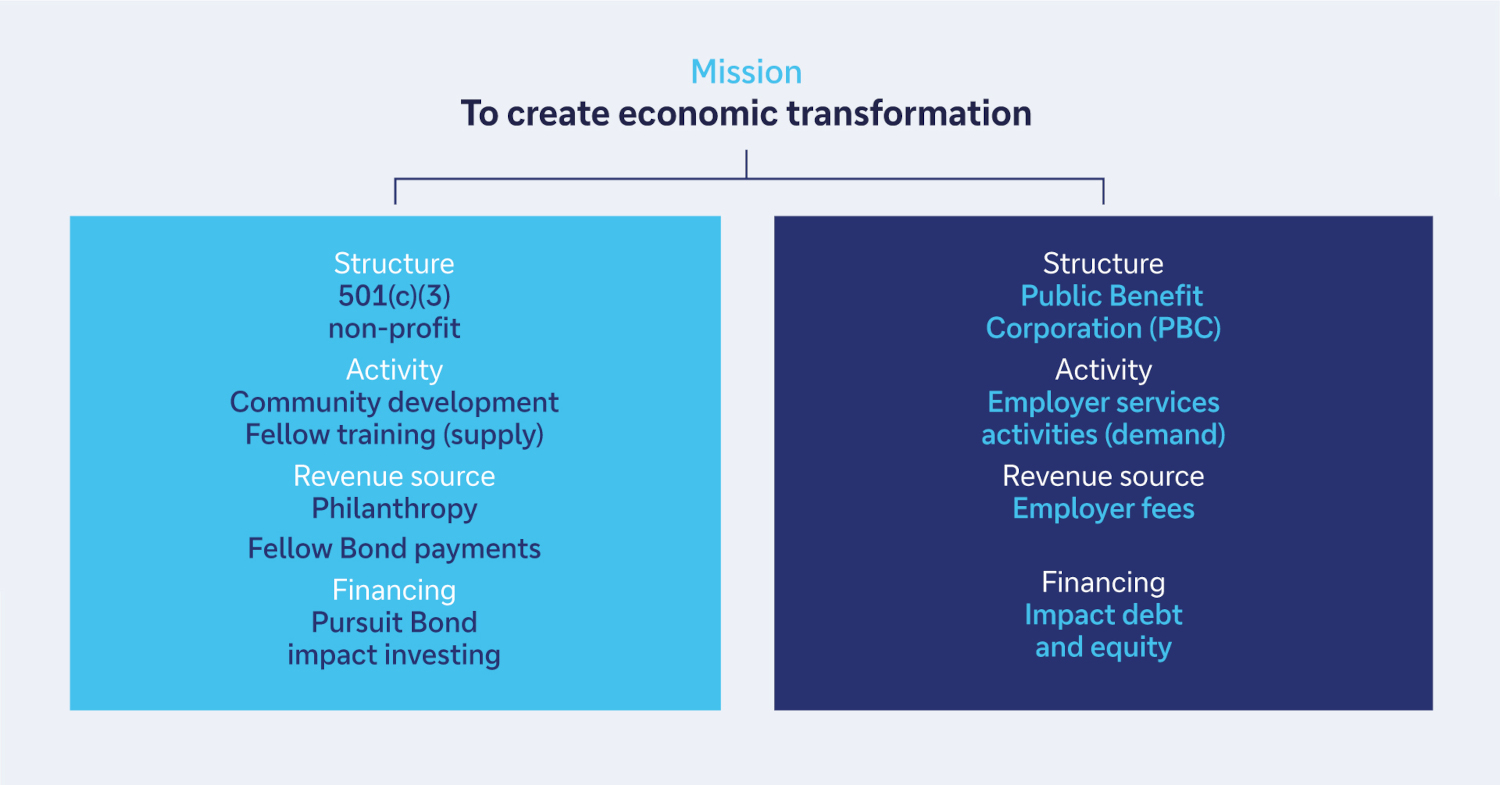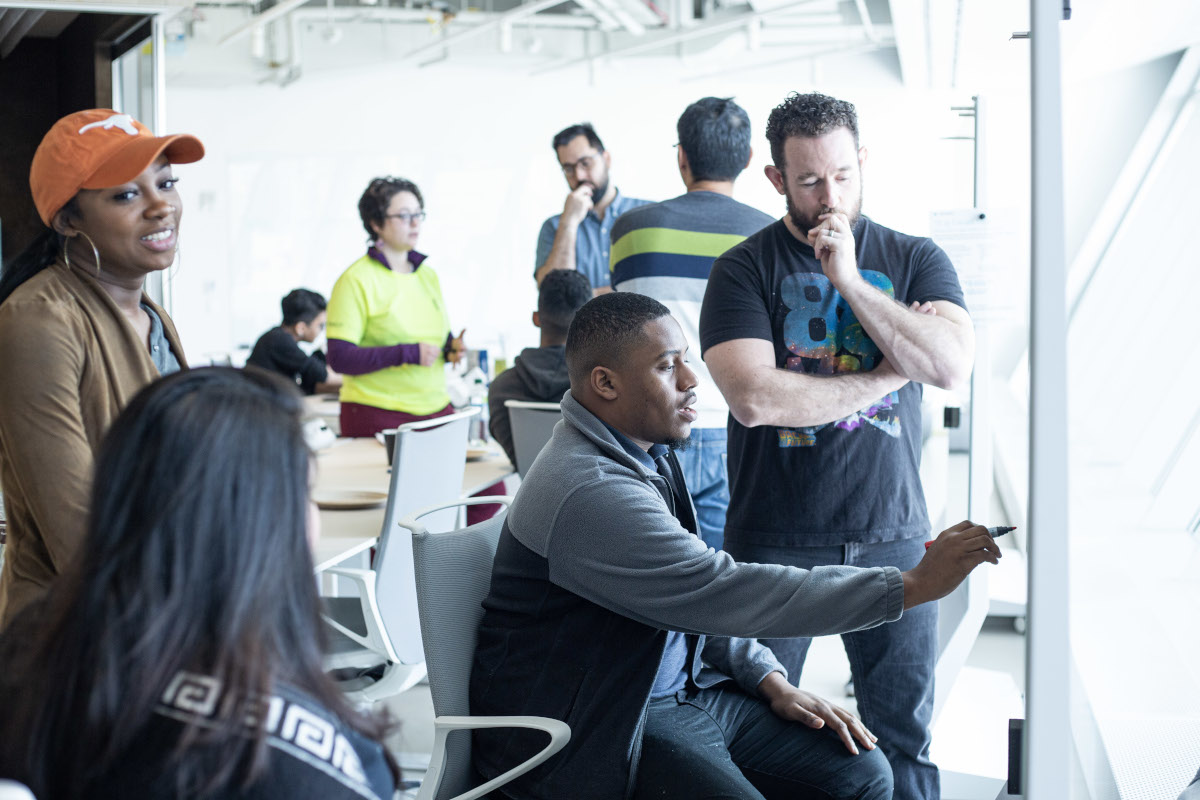24 July 2024
For a great majority of Americans there are limited pathways to good jobs and economic mobility. flow reports on how Deutsche Bank Americas Foundation is supporting the social venture Pursuit to tackle the underlying systems challenges of workforce development
MINUTES min read
Getting access to well-paid jobs has traditionally been one of the best routes to attaining economic mobility and building generational wealth. According to a 2020 report published by the World Economic Forum (WEF), lifelong learning needs to be fostered to improve economic prospects. “It’s important that talent development —the continual process of learning and upskilling— becomes an integral part of employment relationships, with new actors, financing and delivery models brought to bear,” states the report.1
This is particularly true in today’s labour market, where skills are necessary but not sufficient to get hired and be retained. Instead, employers rely on visible assets like college degrees when hiring new talent. In 2022, wages for workers in the US with at least a college degree were about 75% higher on average than those earned by high school graduates – although this wage premium had slightly decreased during the pandemic.2
In the US, the necessary living wage for an average family is US$80,000.3 Most jobs that pay more than US$60,000 require a four-year college degree. But over 218 million Americans do not have a college degree (this equals 63% of Americans over 25 years old).4 At the same time, student loan debt in the US has more than tripled since 2006 and reached US$1.7trn as of September 2023 – making college not necessarily a good return on investment (ROI).5
Developing new skills with a comprehensive approach
All these conditions create a wealth and opportunity gap. This is where the social venture Pursuit comes in. Pursuit’s mission is to create economic transformation. “We are tackling the structural challenges within the labour market through an integrated strategy which includes community development, pre-job training, employment, financial products, and policy,” explains Jukay Hsu, CEO and co-founder of Pursuit.
Launched in 2013 in the New York City borough of Queens with an initial class of 23 fellows, Pursuit has since trained 1270 low-income adults with proven success. According to the venture, 40% of its Fellows are immigrants, 60% do not have a bachelor’s degree, and more than 50% receive public assistance. Before joining the Pursuit programme, the participants made US$18,000 on average. After obtaining their first job, their income reached over US$90,000 on average, adding US$2m in estimated lifetime earnings per person, Pursuit says.
“We are tackling the structural challenges within the labour market through an integrated strategy”
According to Pursuit, “the current workforce development system in the US is broken”. Structural barriers and misalignments across three pillars would prevent low-income individuals from accessing high-paying jobs: Many workers simply aren’t aware about potential jobs and careers and how they could attain the necessary skills. Further, they don’t typically have access to networks within the industry to serve as role models, mentors, and sponsors to support them along their journey.
For employers, on the other hand, “it is often too costly to invest in training entry-level talent unless they already have a baseline education in or understanding of the field”, says Hsu.
Further, workforce development programmes remain “chronically underfunded”, he adds. Pursuit estimates that in New York City less than US$28m is committed annually in philanthropic funding for all adult training, significantly below the US$60bn that is needed to train the 1.7 million unemployed or underemployed New Yorkers6.
“This is why we have built integrated programmes combining training, employer services, and new sources of finance,” explains Hsu. In support of this approach, a hybrid social enterprise business model was established with two related entities: a 501(c)(3) non-profit and a public benefit corporation (PBC). While the former is engaged in fellow pre-job training, community development, and policy, the latter works with employers such as Uber, Blackstone, and Peloton to help them hire, retain, and nurture non-traditional talent.

Figure 1: Pursuit’s social enterprise structure
Transforming lives
One of the graduates from the Pursuit Fellowship program is Max Mezalon – a Haitian immigrant who was diagnosed with bi-polar disorder and lost his mother to breast cancer at the age of 11. “Yes, I had many roadblocks, but I also have many characteristics that are greater than these impediments,” Mezalon recalls, “I am motivated. I work hard to solve problems. I don’t settle for less than my goals. I am intelligent and believe in being the best role model at work and at home.”
In the past, he worked at Domino’s Pizza and as an Uber driver. Yet, in 2018, he took the chance to enrol at Pursuit. Balancing his day job working as an Uber driver with intensive coding coursework at Pursuit was not easy – there were good days, and challenging days, Mezalon says. “I was at a point where I almost gave up, but through it all, the support was there when I felt overwhelmed. We had a strong community. We had technical coaches, many office hours with our instructors, and check-ins with our managers to keep us on track.”
The technical and professional skills that he acquired through the Pursuit Fellowship Program enabled him to eventually become a software engineer at Blackstone, one of Pursuit’s employer partners. “I am a firm believer that if you keep working hard towards a goal, you will be rewarded. Doors can’t be closed forever; keep pushing, and the right person or people will come to help you open it.”
An evolving financing structure
To enable outcomes such as that demonstrated in Mezalon’s experience, Pursuit requires funding. The Deutsche Bank Americas Foundation (DBAF) has been an early philanthropic supporter of Pursuit, providing ongoing grant funding since 2019 to support the operational capacity of the organisation to continue growing its Fellowship Program capabilities and the launch of its impact bond offering.
In 2016, Pursuit started its outcomes-based financing model to fund the programme. The model raises non-philanthropic capital to operate the program and supports Fellows to attend the programme with no upfront costs, loans, or debt. Fellows then pay a percentage of their earnings for a set duration to Pursuit after landing full-time high-paying roles. These payments enable Pursuit to support more future training, expand services, and repay the impact investors who had funded the upfront costs of the programme.
The first bond piloted and issued in 2016 was fully repaid in 2020. The second one – a US$12.25m impact bond – was raised in 2021 from institutional impact investors such as Blue Earth Capital and the Inherent Foundation. “This type of financing aligns incentives and outcomes across Pursuit, Fellows, and our investors and ultimately makes Pursuit as an organisation accountable for the success of our Fellows,” explains Hsu.
Building off the success of its Fellowship Program and its bond offering, Pursuit launched its Employer Services initiative in 2023. This new service aims to align its pipeline of Fellows with employer needs, working consultatively with companies to build their capacity around non-traditional hiring, and providing follow-on career support to its Fellows. In parallel, once Fellows are hired into a software engineer job at our employer partners, Pursuit provides three years of career development and support to our Fellows, with the goal of building long-term careers at partner companies.

In August 2023, the Deutsche Bank Community Development Finance Group (CDFG) closed a US$ 500,000 programme-related investment (PRI) loan into Pursuit PBC. This loan was made through Deutsche Bank Americas Foundation’s New Initiatives Fund (NIF) impact investing programme. The funding was made alongside other impact investors for a total of US$5m in catalytic financing into Pursuit PBC. In addition to supporting the scale up of Pursuit PBC’s Employer Services offering, the catalytic financing will enable Pursuit to enhance its training and professional development capabilities. Over the next five years, the financing aims to equip Pursuit to secure high-paying jobs for 1,000 Fellows.
“We believe that this programme-related investment into Pursuit will be catalytic to driving systemic changes in the broader labour market, through removing barriers for non-traditional talent while meeting the talent demands of employers,” said Feona Castro, Vice President at the Deutsche Bank Community Development Finance Group. “We are proud to partner with Pursuit in furthering their mission to create pathways to upward economic mobility for Pursuit Fellows and in demonstrating successful outcomes-driven models that employ a collaborative, multi-stakeholder approach.”
Note: all images are © Pursuit
Sources
1 See weforum.org
2 See frbsf.org
3 See U.S. Census Bureau, Current Population Survey, 2019
4 See Inside Higher Ed “Wealth Gains for Americans Who Lack College Degrees”, September 2017
5 See cfr.org
6 See osc.ny.gov



